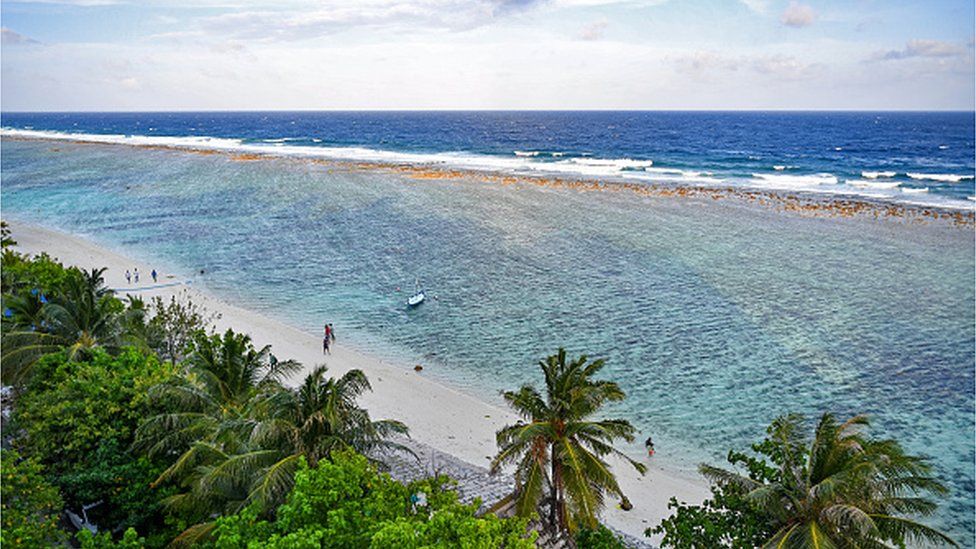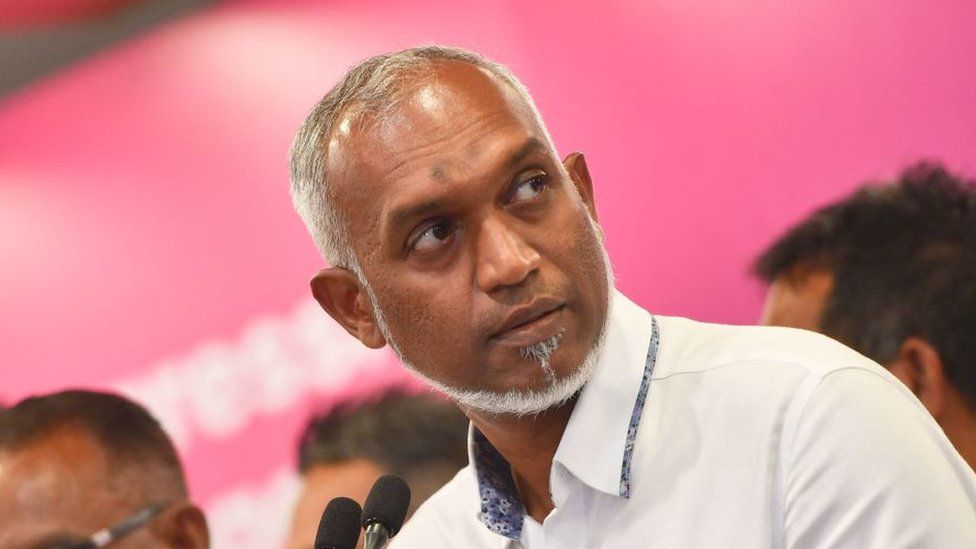Maldives ultimatum on troops deepens row with India
-
Published

Bilateral ties between the Maldives and India – that have hit rock-bottom in recent weeks – have taken another tumble after Male formally asked Delhi to withdraw its troops from the island nation by 15 March.
The demand was conveyed at the first meeting of a high-level core group between the two sides held on Sunday in the Maldivian capital of Male.
“Indian military personnel cannot stay in the Maldives. That’s the policy of this administration,” Abdulla Nazim Ibrahim, the public policy secretary in President Mohamed Muizzu’s office, said.
There are about 80 Indian troops in the Maldives – Delhi says they are based there to maintain and operate two rescue and reconnaissance helicopters and a Dornier aircraft it had donated years ago.
Removing the Indian military personnel from the island nation was the election pledge of Mr Muizzu who took over in mid-November. His campaign was centred on ‘India out’ policy, with a promise to send Indian troops home and reduce Delhi’s influence.
On Sunday, Delhi said the officials of the two countries discussed “finding mutually workable solutions to enable continued operation of Indian aviation platforms that provide humanitarian aid and medvac [medical evacuation] services to the people of Maldives”.
But the Indian foreign ministry statement did not mention any timeline for the withdrawal of Indian soldiers from the islands.
The Maldives-India meeting took place a day after Mr Muizzu returned from a state visit to China where he met President Xi Jinping and other senior officials. Beijing and Male agreed to elevate their relations to a comprehensive strategic cooperative partnership.
Ahead of Mr Muizzu’s trip, a row had erupted between India and Maldives after three Maldivian deputy ministers made derogatory comments about Indian Prime Minister Narendra Modi on social media. Following an uproar, the three ministers were suspended.
But Mr Muizzu’s tone was defiant when he addressed a press conference after he returned from Beijing.
He said the Maldives would diversify its food imports and overseas healthcare services, ostensibly to reduce his country’s dependence on India.
Mr Muizzu also announced plans to import food from Turkey, medicines from Europe and the US and said that Maldivians who were eligible under a state health insurance scheme could go to Dubai and Thailand for treatment. At present, most people go to India and Sri Lanka.
“We are not a country that is in the backyard of another country. We are an independent nation,” he added.
Mr Muizzu’s closing comment was: “We may be small, but that doesn’t give you the licence to bully us.”

This was seen as a response to the massive social media backlash in India over the deputy ministers’ controversial comments on Mr Modi. Hashtags calling for a boycott of Maldives were trending on Indian social media all of last week.
Analysts say these are perhaps the strongest comments made by Mr Muizzu since he assumed office, indicating a foreign policy route that’s not India-centric.
“If Male is seeking a diplomatic solution to the existing difference with Delhi, it is also counterproductive for the president to make such public comments implicating the Maldives’s closest bilateral partner,” Azim Zahir, a Maldivian political analyst, told the BBC.
Such comments, he said, “could cause irreversible damage to the India-Maldives relations”.
Many in the Maldives believe that Mr Muizzu’s plans to reduce dependency on India for food import or medicines are not practical.
“You can bring food from anywhere in the world, including Turkey. But is it economical? The transport cost will be more expensive than importing food from India,” Ali Azim, a senior leader of the Democrats party, told the BBC.
He added that Mr Muizzu was seeking to whip up “anti-India sentiments” ahead of the forthcoming parliamentary elections in March.
Maldivian experts point out that Mr Muizzu is also taking a strong stance towards Delhi because he is aware that Islamist hardliners, including the ultra-conservative Salafis, in the country support his policies towards India.
For Delhi, the latest row comes at a time when supporters of the Indian government have been highlighting its “muscular foreign policy” and India’s emergence as an economic and military power.
Nevertheless, India’s Foreign Minister S Jaishankar gave a restrained response to the ongoing diplomatic row with Male.
“Politics is politics. I cannot guarantee that in every country, every day, everybody will support us or agree with us,” he told a gathering in the Indian city of Nagpur on Sunday.
As a small island nation, the Maldives depends on its giant neighbour India for most of its food, infrastructure building, and healthcare.
Several residents in Male say that although they are worried about Delhi’s reaction to the ongoing diplomatic spat, they are also resentful about India’s “overbearing presence” in the archipelago.
“I think without some concessions on India’s part, there’s added risk of a serious row between Delhi and Male,” Mr Zahir, the political analyst, said.

Read more India stories from the BBC:
- The Indian hotel murder that inspired Agatha Christie
- The maestro who took classical music to India’s masses
- Why English is a touchy topic in India’s Silicon Valley
- Maldivians debate India’s ‘boycott’ of their nation
- The men conned by ‘impregnating women’ job scam
- Supreme Court cancels release of 2002 riots rapists
- India summons Maldives envoy over Modi insult row

